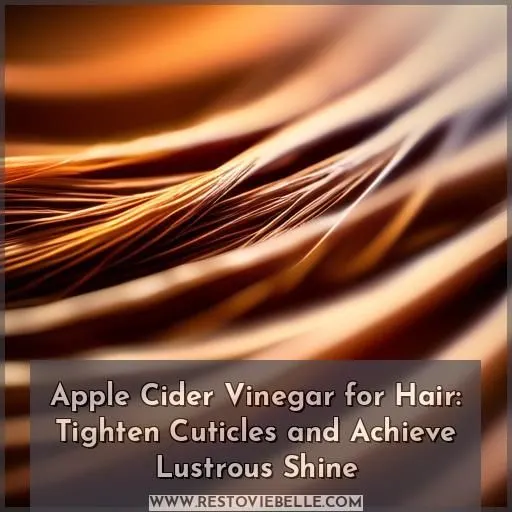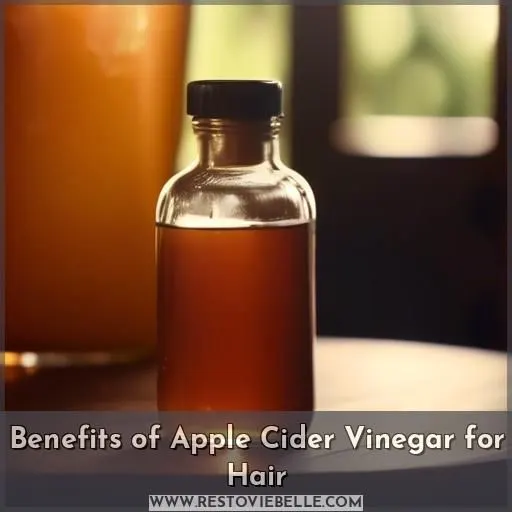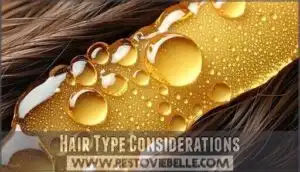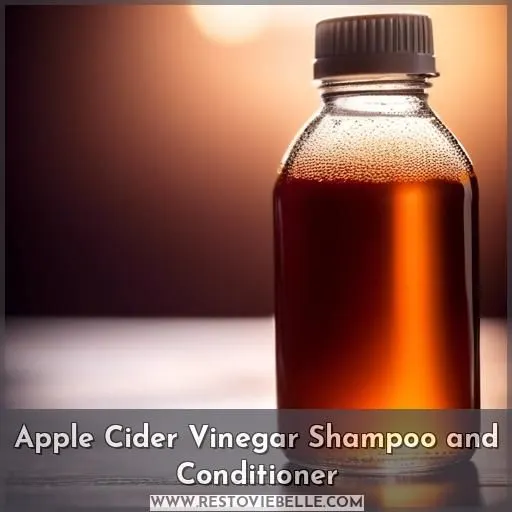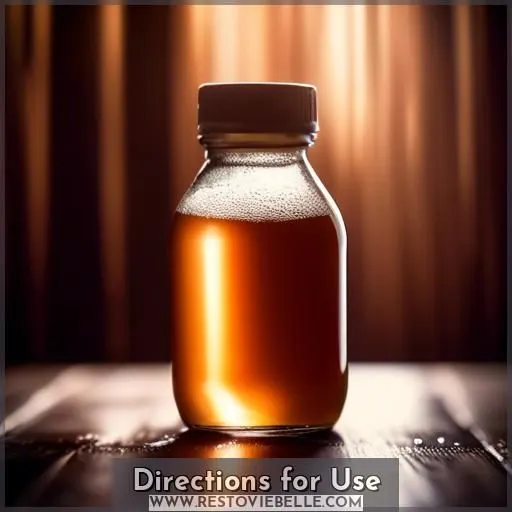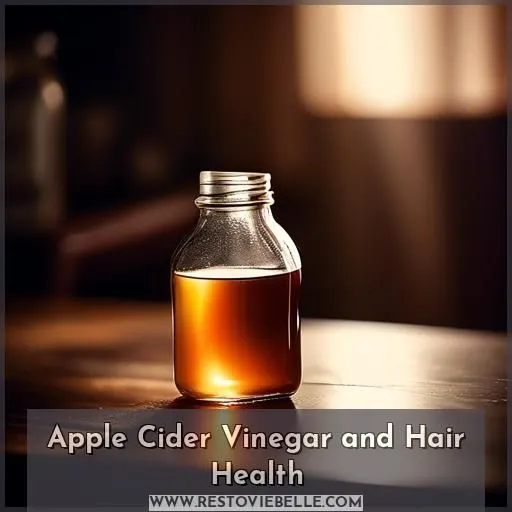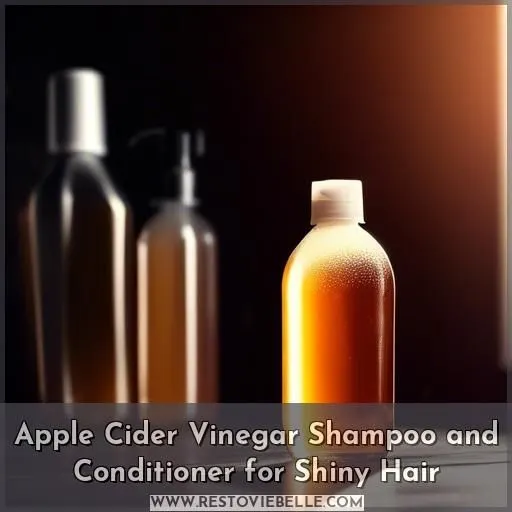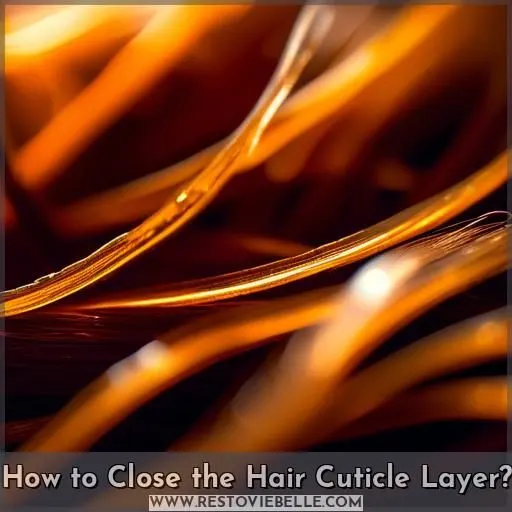This site is supported by our readers. We may earn a commission, at no cost to you, if you purchase through links.
Apple cider vinegar’s acidic pH can tighten and close your hair cuticles, leading to a sleek, smooth appearance. By restoring your hair’s natural pH balance, apple cider vinegar seals the cuticle layer, reducing frizz and enhancing shine.
Its antimicrobial properties also cleanse your scalp, promoting healthy hair growth. When used regularly, an apple cider vinegar shampoo and conditioner duo can effectively close your hair cuticles, smoothing the surface and locking in moisture for lustrous, manageable locks.
Table Of Contents
- Key Takeaways
- Benefits of Apple Cider Vinegar for Hair
- Hair Type Considerations
- Apple Cider Vinegar Shampoo and Conditioner
- Directions for Use
- Apple Cider Vinegar and Hair Health
- Apple Cider Vinegar Shampoo and Conditioner for Shiny Hair
- How to Close the Hair Cuticle Layer?
- Frequently Asked Questions (FAQs)
- Conclusion
Key Takeaways
- Apple cider vinegar’s acidic pH can tighten and close hair cuticles, leading to a sleek, smooth appearance.
- By restoring hair’s natural pH balance, apple cider vinegar seals the cuticle layer, reducing frizz and enhancing shine.
- Apple cider vinegar’s antimicrobial properties cleanse the scalp, promoting healthy hair growth.
- Regular use of an apple cider vinegar shampoo and conditioner duo can effectively close hair cuticles, smoothing the surface and locking in moisture for lustrous, manageable locks.
Benefits of Apple Cider Vinegar for Hair
Apple cider vinegar is a powerful ingredient that can work wonders for your hair. By sealing your hair cuticles, it can promote a healthy scalp, reduce color fading, and leave your tresses feeling stronger, softer, and more manageable.
Promotes a Healthy Scalp
Using apple cider vinegar for your hair can offer numerous benefits, including promoting a healthy scalp. The acidic properties of apple cider vinegar help to restore the natural pH balance of your hair and scalp, ensuring that your cuticles remain closed and your hair retains moisture.
This gentle cleansing action can also help to remove product buildup and prevent scalp irritation. By incorporating apple cider vinegar into your hair care routine, you can achieve a healthier, more balanced scalp, which in turn can lead to stronger, shinier, and more manageable hair.
Reduces Color Fading
Continuing your quest for vibrant hair, apple cider vinegar shampoo acts as a clarifying guardian, preventing color fade and cuticle damage.
Detangles
Detangling is a crucial element of maintaining healthy hair. Apple cider vinegar (ACV) can be a transformative solution for those grappling with hair tangles. Here are three ways ACV can assist:
- Smooths the hair surface: ACV can aid in smoothing the hair surface, facilitating the passage of a comb or brush through the hair.
- Reduces frizz: By smoothing the hair surface, ACV can also contribute to reducing frizz and enhancing hair manageability.
- Natural conditioner: ACV can function as a natural conditioner, aiding in softening and conditioning the hair.
For those with tangled hair, an ACV rinse can be a godsend. To utilize, combine a tablespoon of ACV with a cup of water and rinse your hair after shampooing. This can assist in removing product accumulation and leave your hair smoother and more manageable.
In addition to ACV, other ingredients can be advantageous for detangling. For instance, lavender essential oil can contribute to softening and conditioning the hair, making it easier to detangle. Distilled water can also be employed to dilute ACV, ensuring an even application and more enduring results.
When utilizing ACV for detangling, it’s imperative to employ it in moderation. Pure ACV can be drying, so it’s advisable to dilute it with water and use it sparingly. Always adhere to the instructions on the product label or seek the advice of a professional stylist for personalized recommendations.
Strengthens and Softens
Apple cider vinegar (ACV) is a prevalent component in hair care, renowned for its prospective advantages in invigorating and smoothening hair. ACV is believed to assist in sustaining the scalp’s pH equilibrium, which is significant for salubrious hair development. By re-establishing the scalp’s pH, ACV can assist in diminishing breakage, frizz, and preserving elasticity. In addition, ACV’s antimicrobial properties can combat dandruff and scalp irritation, further adding to more robust, healthier hair.
To utilize ACV for hair invigoration, attenuate it with water in a proportion of 1:1 or 1:3, contingent upon your hair type. For individuals with a delicate scalp or fine hair, employ a 1:3 proportion. Massage the diluted ACV onto your scalp subsequent to shampooing, permit it to remain for a few moments, and then rinse meticulously. Alternatively, you can utilize ACV as a pre-shampoo treatment by applying it to your hair before shampooing.
When employing ACV, it’s quintessential to be circumspect of potential adverse effects. Excessive use can lead to scalp irritation and hair impairment, so confine your treatments to once a week. Invariably attenuate ACV with water to avert aridity or pruritus.
Fights Frizz
Apple cider vinegar (ACV) is a versatile ingredient that offers numerous benefits for hair health. Here are four ways ACV can help fight frizz and improve the overall appearance of your hair:
- Closes the hair cuticle: ACV helps flatten the hair cuticle, which can lead to smoother, less frizzy hair. This is because a closed cuticle layer reflects light more evenly, giving your hair a shinier appearance.
- Balances pH: By lowering the pH of your scalp, ACV can help maintain a healthy acidity level, which is essential for keeping the cuticle layer flat and closed. This can result in less frizz and improved manageability.
- Prevents fungal and bacterial growth: The antimicrobial properties of ACV can help keep the hair and scalp healthy, reducing the likelihood of fungal and bacterial infections that can lead to frizz and other hair issues.
- Nourishes the hair: ACV contains vitamins B and C, which support stronger-looking hair and help to strengthen hair strands. This can contribute to less breakage and reduced frizz.
To incorporate ACV into your hair care routine, consider using a pre-shampoo treatment, shampoo, or conditioner that contains ACV. These products can help clarify your scalp, remove buildup, and promote a healthier, more balanced scalp environment. Remember to dilute ACV with water before applying it to your hair to avoid irritation or damage.
Reduces Hair Loss
Apple cider vinegar can be beneficial for hair growth. It helps to reduce hair breakage and promote hair regrowth. The acidic content of apple cider vinegar can help to balance the pH levels of the scalp, which is essential for healthy hair growth. Additionally, apple cider vinegar can help to increase blood circulation in the scalp, which can stimulate hair follicles and promote hair growth.
The use of apple cider vinegar in hair care can also help to improve hair density. It can strengthen hair strands and prevent hair loss.
Cleanses
After addressing hair loss, let’s explore how apple cider vinegar purifies:
- Eliminates product buildup, enhancing scalp well-being
- Prevents color fading
- Controls frizz effectively
Hair Type Considerations
You’ll be pleased to know that apple cider vinegar is safe for all hair types, including color-treated tresses. What’s more, it’s especially beneficial for those who struggle with major product buildup.
Safe for All Hair Types, Including Color-treated Tresses
Apple cider vinegar is safe for all hair types, including color-treated tresses. It can help with color retention by balancing the pH of your hair, preventing color fading.
For those with product buildup, apple cider vinegar can gently cleanse the scalp without disturbing its natural acidic environment. It also promotes moisture retention, reducing hair breakage and tangles.
Use it as a pre-shampoo treatment or in a shampoo and conditioner duo for best results.
Especially Beneficial for Those With Major Product Buildup
Especially beneficial for those with major product buildup, apple cider vinegar (ACV) can help restore the natural shine and health of your hair. Here are four ways ACV can improve your hair:
- Clarifies the Scalp: ACV gently exfoliates the scalp, removing excess oils and product buildup that can cause irritation and itchiness.
- Balances pH Levels: The acidic nature of ACV helps restore the pH balance of your scalp, which can lead to a healthier, more balanced scalp environment.
- Reduces Frizz: By smoothing the hair cuticle, ACV can help reduce frizz and improve overall hair texture.
- Detangles Hair: The acidic nature of ACV makes it easier to detangle hair, reducing breakage and promoting smoother, more manageable hair.
To incorporate ACV into your hair care routine, consider using an apple cider vinegar shampoo or conditioner, or creating a DIY apple cider vinegar rinse. Always dilute ACV with water to avoid over-drying your hair, and follow up with a moisturizing conditioner or hair mask to maintain hydration.
Apple Cider Vinegar Shampoo and Conditioner
Apple cider vinegar shampoo and conditioner work together to close and tighten your hair’s cuticle layer. This helps protect your hair from damage while reducing frizz and tangles for smoother, more manageable locks.
Apple Cider Vinegar Conditioner Closes and Tightens Hair Cuticles
Apple cider vinegar conditioner, infused with ACV, closes and tightens hair cuticles, improving hair porosity and scalp health. Dry hair types should use a higher water to ACV ratio. Apple cider vinegar helps with product buildup and hair growth, making it a must-have for all hair types, including color-treated tresses.
Apple Cider Vinegar Conditioner Protects Hair From Damage
Apple cider vinegar conditioner protects your hair from damage by maintaining the hair’s natural pH balance. This helps prevent breakage and enhances hair shine. By using apple cider vinegar conditioner, you can promote hair growth and improve scalp health.
Apple Cider Vinegar Conditioner Reduces Frizz and Hair Tangles
Continuing from how apple cider vinegar (ACV) conditioner shields your hair from damage, it’s also a game-changer for taming frizz and untangling knots.
- Feel the magic as ACV turns your hair battles into smooth victories.
- Revel in the ease of combing through tangle-free, silky strands.
- Experience the transformation, from unruly to effortlessly sleek.
Directions for Use
To make the most of apple cider vinegar for your hair, use it appropriately in your routine. Apply the apple cider vinegar shampoo and conditioner as directed for the best results in tightening your cuticles and achieving lustrous shine.
Apple Cider Vinegar is Natural and Safe for Hair
Apple cider vinegar is a natural ingredient that can be beneficial for hair health. It has an acidic content and low pH level, which helps seal hair cuticles, enabling hair to retain moisture and balance the hair pH. This can lead to a healthy scalp, reduced color fading, detangling, strengthening and softening, and frizz reduction.
It also helps reduce hair loss and cleanses the scalp without disturbing its natural acidic environment. However, pure apple cider vinegar can dry out hair, so it should be used in moderation.
Apple cider vinegar shampoo and conditioner have a balanced formula of acid (ACV) and alkali (surfactants), gently cleansing oils and dirt from hair and scalp, while the conditioner closes and tightens hair cuticles, protects hair from damage, and reduces frizz and hair tangles.
To use apple cider vinegar on your hair, dilute it with water and apply it after shampooing and conditioning. For best results, follow the directions provided by the product or consult a professional stylist.
Apply Apple Cider Vinegar Duo Correctly for Best Results
To achieve the best results with apple cider vinegar (ACV) for your hair, follow these guidelines:
- Dilution: Mix 2-3 tablespoons of ACV with 8 ounces of water. This dilution is suitable for most hair types, but adjust the amount according to your hair’s sensitivity.
- Application: After shampooing and conditioning, pour the diluted ACV over your hair and work it into your scalp. Let it sit for a couple of minutes before rinsing with cool or cold water to close the cuticle and boost shine.
- Frequency: For those with thin or fragile hair, apply the rinse every few weeks or twice a month. Those with a sensitive scalp should consider using it only a couple of times a month. Long, thick hair can be treated up to twice a week. Adjust the frequency based on how the solution feels on your scalp and hair.
- Caution: If you experience stinging, itchiness, or dry sensations after using ACV on your scalp, discontinue its use and opt for a salon product recommended by a professional.
Remember that apple cider vinegar isn’t a clarifying shampoo but can help with product buildup, improve hair texture, and restore balance to an irritated scalp. Use it as a rinse after shampooing and conditioning, and follow up with conditioner to lock in the benefits.
Apple Cider Vinegar and Hair Health
Apple cider vinegar (ACV) is a widely used natural remedy for hair well-being, offering advantages from promoting scalp health to minimizing color fading and combating frizz. ACV is notably effective for individuals with dry scalp or excessive product accumulation, gently cleansing the scalp without disrupting its inherent acidic environment. However, it’s crucial to evaluate your hair type and scalp condition prior to using ACV, as it may worsen dryness or trigger irritation for those with sensitive skin.
Utilizing ACV for hair health can aid in maintaining the pH equilibrium of your hair and scalp, resulting in smoother, stronger, and more lustrous hair. It also smooths the hair cuticle, reducing frizz and making hair more manageable. Moreover, ACV can assist in detangling hair, preserving hair color, and strengthening hair follicles, preventing split ends or hair breakage.
While ACV isn’t a solution for hair loss, it can help sustain a healthy scalp environment, which can contribute to reduced hair loss. It also possesses antimicrobial properties, which may combat the yeast and irritation that can lead to scalp conditions such as dandruff.
To incorporate ACV into your hair care regimen, you can employ it as a pre-shampoo treatment, a clarifying rinse, or a leave-in conditioner. It’s essential to dilute ACV with water and use it sparingly to prevent excessive drying or irritation.
Apple Cider Vinegar Shampoo and Conditioner for Shiny Hair
Apple cider vinegar shampoo and conditioner can provide benefits for hair, such as promoting shine, reducing color fading, detangling, and fighting frizz. These products are suitable for all hair types, including color-treated tresses, and can be especially beneficial for those with major product buildup or oily hair types.
Apple cider vinegar shampoo and conditioner work by balancing the pH of the hair and scalp, gently cleansing, and promoting a healthy scalp. They’re also infused with ingredients like botanical keratin and jojoba oil to enhance hair health and shine.
To use apple cider vinegar shampoo and conditioner, apply them to wet hair, concentrating on the scalp, and rinse thoroughly.
How to Close the Hair Cuticle Layer?
Continuing from the sparkling benefits of apple cider vinegar shampoo and conditioner, let’s delve into the specifics of how to seal that hair cuticle layer. It’s like encasing your hair in its own protective shield.
- Rinse with cold water to snap those cuticles shut.
- Use a pH-balanced shampoo; it’s like murmuring soothing words to your hair.
- Apply a leave-in conditioner; envision it as a defense screen for your strands.
- Limit heat styling; your hair prefers to stay cool.
- Embrace air drying; patience rewards you, ultimately.
Frequently Asked Questions (FAQs)
What is the ideal pH for hair cuticles?
Your hair thrives when its cuticles remain closed within a pH range of 5 to 5 – the sweet spot that seals in moisture and protects strands from damage.
Can apple cider vinegar be used for hair loss?
Apple cider vinegar’s acidity can stimulate the scalp, unclog follicles, and nourish roots to promote healthy hair growth. Just be sure to use it in moderation to avoid drying out your hair.
How long should I leave apple cider vinegar on my hair?
Research shows leaving apple cider vinegar on your hair for 3-5 minutes is ideal. This allows the acidic pH to penetrate and close hair cuticles, leaving locks smoother, softer, and shinier. Don’t overdo it – rinse thoroughly after.
Is apple cider vinegar safe for damaged hair?
Absolutely, apple cider vinegar is safe and even beneficial for damaged hair. Its mild acidity helps repair and strengthen the hair cuticle, restoring luster and manageability. Start with a diluted solution to avoid over-drying.
Can I use apple cider vinegar with other hair products?
Yes, you can use apple cider vinegar with other hair products! In fact, the acidic pH of ACV complements most products, helping close cuticles and boost hair’s shine. Just avoid too much buildup.
Conclusion
Visualize your hair transformed, the once-frizzy strands now sleek and glossy. This metamorphosis is made possible by the power of apple cider vinegar.
By tightening your hair cuticles, this natural elixir seals in moisture, amplifying your hair’s shine and manageability.
Incorporate an apple cider vinegar shampoo and conditioner duo into your routine, and witness the remarkable restorative effects as your locks become lustrous, healthy, and beautifully manageable.

